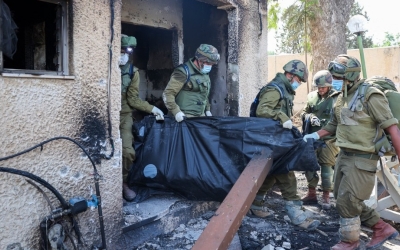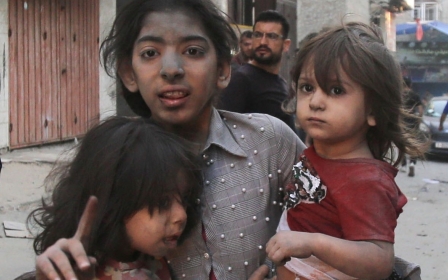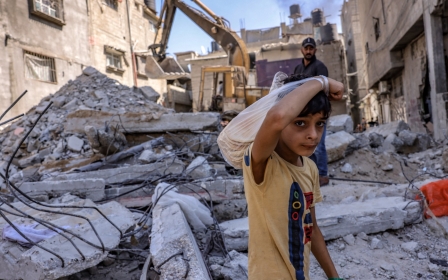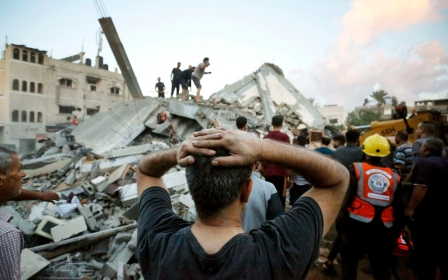Israel-Palestine war: The incendiary rhetoric deployed by Israeli leaders
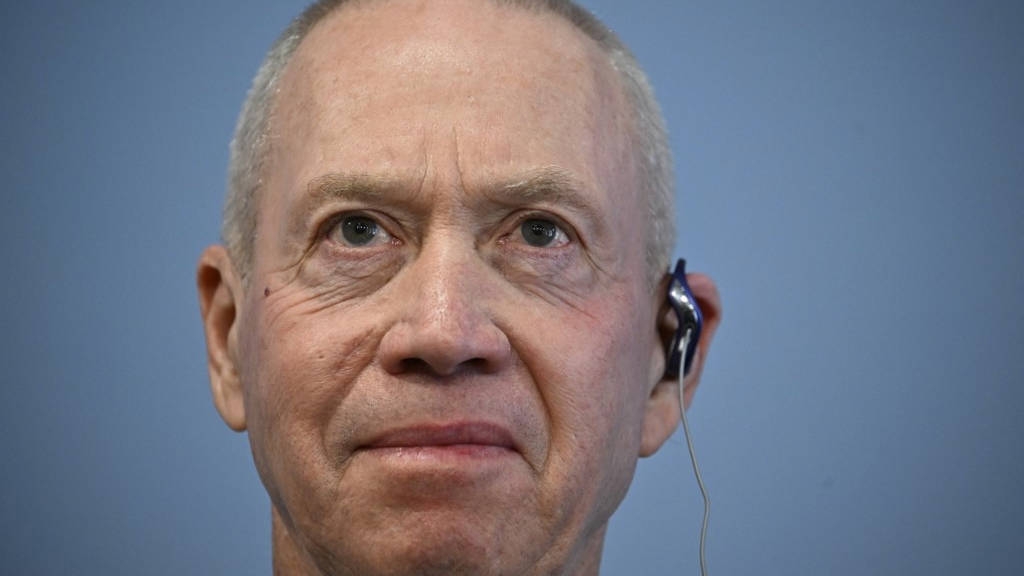
Israeli leaders have not just responded to Hamas's Saturday attack with bombs, bullets, and the cutting of water, electricity, food, and fuel supplies to the besieged Gaza Strop.
Senior Israeli politicians and military officials have deployed a barrage of dehumanising and incendiary rhetoric in public and used the language of collective punishment when describing their military response.
Palestinians have been described as "human animals" and "beasts", with one former Israeli general saying his military "must create an unprecedented humanitarian disaster in Gaza".
Israeli Prime Minister Benjamin Netanyahu and other politicians have spoken in apocalyptic terms about enacting revenge.
"We will destroy them and we will forcefully avenge this dark day that they have forced on the state of Israel and its citizens," Netanyahu said on Sunday.
"All of the places which Hamas is deployed, hiding and operating in, that wicked city, we will turn them into rubble. I say to the residents of Gaza: leave now because we will operate forcefully everywhere."
The residents of Gaza, who number over two million, are subject to an air, land, and sea blockade and have nowhere to go.
Israelis have also been subject to fierce criticism, with the space for nuance severely restricted.
Political analyst Akiva Eldar told Al Jazeera that Israelis like him, who in the past has been critical of the Israeli occupation and government, have been abused online and branded as "traitors".
Follow Middle East Eye's live coverage for the latest on the Israel-Palestine war
Figures on the Israeli far-right have argued for the reoccupation of Gaza, the establishment of settlements there, and the banning of Muslims from the al-Aqsa mosque complex, known as Temple Mount to Jews.
The use of dehumanising language is not new. Menachem Begin, Israel's sixth prime minister and the founder of Likud, the party now led by current prime minister Benjamin Netanyahu, referred to Palestinian leader Yasser Arafat as a "beast on two legs".
'Right now, one goal: Nakba! A Nakba that will overshadow the Nakba of 48'
- Ariel Kallner, Israeli parliamentarian
More recently, in the wake of a violent rampage by Israeli settlers through the Palestinian village of Huwwara in February, Israel's far-right finance minister Bezalel Smotrich said: "The Palestinian village of Huwwara should be wiped out. The state needs to do it and not private citizens."
As of Thursday, over 1,350 Palestinians and 1,300 Israelis had died in the ongoing war.
The Israeli air force has been hitting Gaza with air strikes since Saturday, blowing apart refugee camps and destroying dozens and dozens of civilian buildings, including residential homes, mosques, hospitals, and banks.
Over the last six days, Israel has vowed to retaliate in a variety of ways, with officials including Netanyahu branding Hamas, whose fighters have reportedly killed children and other civilians during their attacks, "worse than Isis (Islamic State)".
Here, Middle East Eye looks at some of the comments that have been made by Israeli officials.
A second Nakba
On Saturday Ariel Kallner, a member of Israel's parliament representing the Likud party, called for a second Nakba ("catastrophe" in Arabic) to take place in Gaza.
The word refers to the ethnic cleansing of Palestine by Zionist militias to make way for the creation of Israel in 1948.
“Right now, one goal: Nakba! A Nakba that will overshadow the Nakba of '48. Nakba in Gaza and Nakba to anyone who dares to join! Their Nakba, because like then in 1948, the alternative is clear,” Kallner wrote on X, formerly Twitter.
“Turn off the enemy now! This day is our Pearl Harbor. We will still learn the lessons. Right now, one goal: Nakba!”
'Human animals'
On Monday, Israel's Defence Minister Yoav Gallant described Palestinians as "human animals" and vowed to "act accordingly," as fighter jets unleashed a massive bombing campaign on the Gaza Strip.
Gallant announced a "complete siege" of Gaza, saying Israel would cut off all electricity, food, and fuel supplies to the enclave. On Wednesday, Gaza’s only power plant stopped working.
The air, land, and sea blockade, which has gone on for more than 15 years, has had a catastrophic impact on hospitals and Palestinians who have been displaced after the bombing of their homes.
'Unprecedented human disaster'
Former Israeli General Giora Eiland has said that Israel "must create an unprecedented humanitarian disaster in Gaza", saying that the "ultimate tool" is damage to the water system.
"Only the mobilisation of tens of thousands and the cry of the international community will create the leverage for Gaza to be either without Hamas or without people. We are in an existential war," Eiland said.
Cutting water to the Gaza Strip has raised concerns over the spread of disease as thousands of displaced Palestinians gather in schools to seek shelter, with no access to toilets, showers, or drinking water.
Medical officials in Palestine have said the situation could eventually lead to an outbreak of scabies, while Palestinians have said the situation is particularly difficult for women and young girls.
On Wednesday, social media platforms were awash with women in Gaza shedding light on the impact of Israel’s bombardment on women.
According to one social media user, five pregnant women suffered from severe colic, later causing them to miscarry their babies. The miscarriages have been attributed to the extreme fear felt by the women while Israel pummelled the besieged enclave.
The UN estimates that food and water supplies in Gaza will run out in less than 10 days.
Reoccupy Gaza
Hamas's war crimes have given the Israeli far-right an opportunity to advance their "messianic agenda" beyond the Israeli army response in Gaza, argues Yehuda Shaul, co-founder of anti-occupation Israeli veterans' group Breaking the Silence.
This includes the reoccupation of Gaza and the establishment of Israeli settlements there. In an article on Wednesday, right-wing journalist and activist Arnon Segal wrote: "Who dreamed even last week that there would be a wall-to-wall agreement in the Israeli public that the Gaza Strip should be reoccupied?"
Segal argued that it was only in "such terrible circumstances" that Israel's leaders would decide to reoccupy Gaza, "from which we fled 30 years ago".
Israel has called up 300,000 reservists and is mobilising along the perimeter fence that separates the besieged enclave from the rest of the world.
'Doomsday weapon'
Israeli member of parliament Revital Gotliv called on Israel to consider using nuclear weapons on Hamas, in a social media post on Monday.
"Jericho missile! Jericho missile! A strategic alert, before we consider introducing our forces. A doomsday weapon!” she wrote.
Jericho missiles refer to an intermediate-range ballistic missile developed and produced by Israel. The weapons have a 4,800-6,500 km range and are reportedly equipped with a 750kg nuclear warhead.
"Only an explosion that shakes the Middle East will restore this country's dignity, strength, and security! It's time to kiss doomsday," Gotliv added in another post.
The politician called on Israel to “shoot powerful missiles without limit. Not flattening a neighbourhood. Crushing and flattening Gaza.”
Reduce Gaza to 'city of tents'
On Wednesday, an Israeli army official told Channel 13 News that “Gaza is going to be razed to the ground".
The official added that the besieged enclave would be reduced to a “city of tents".
The official said that no building would remain standing in the region.
Similar comments were later made by US Senator Lindsey Graham, who told Fox News: “We are fighting a religious war, and I am on Israel’s side. Israel needs to do whatever it takes, raze this place to the ground.”
Middle East Eye propose une couverture et une analyse indépendantes et incomparables du Moyen-Orient, de l’Afrique du Nord et d’autres régions du monde. Pour en savoir plus sur la reprise de ce contenu et les frais qui s’appliquent, veuillez remplir ce formulaire [en anglais]. Pour en savoir plus sur MEE, cliquez ici [en anglais].


